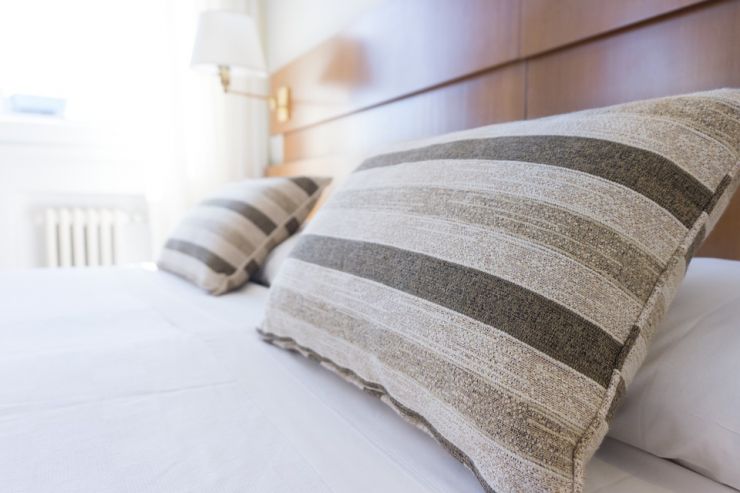
Today we are going to talk about your sleeping environment, namely: your bedroom. Some of this we have touched on in previous posts, and some of it will be new.
Either way, it is important for you to optimize your sleeping environment to promote the best sleep.
Your room needs to be a sanctuary for your sleep. Let’s jump right in.
Number 1: You need a comfy place to sleep.
This includes the bed itself, your sheets and blankets, and your pillow(s).
Number 1-A: You should sleep in a comfortable bed.
For more detail on this, see the Bedtime Routine post, number 3. Or better yet, get the FREE Comfortable Bedding Guide, located right below.
Number 1-B: Your blankets and sheets she also be comfortable.
Cotton is usually preferred to satin. Also, keep in mind the climate. If it is winter and there is snow on the ground, you might want an extra blanket or two. Also, crisp new clean sheets have a way of feeling luxurious and promote sleep. Changing your sheets at least once every week or so is not only hygienic, it’s sleep hygienic.
Number 1-C: Pillows. Have a pillow that supports your neck and head, and is not too hard or soft.
Remember, they wear out after a while.

Number 2: Your room should be cool.
The body sleeps better at a cooler temperature. The optimal temperature should range between 62-72 degrees Fahrenheit. To some of you, 62 is just way too cold.
Once you have found the ideal room temperature, keep it there as best as possible. If there is a warmer or colder night, try adjusting the number of blankets before adjusting the thermostat. Fine, go closer to 72. For others, 72 is way too warm. Fine, turn the thermostat down. You may have to experiment with what temperature you sleep best at.
Number 3: Have a dark room.
Darkness is a cue for your body to sleep. Bright lights can interrupt the body's natural sleep pattern. It’s important for you to control your exposure to light when you sleep.
Here are some things can help to make your room as dark as possible. My first recommendation is black-out curtains. They work great, and they don’t let the light in. Whether its moonlight, street lights, or even daylight (for you shift workers), black-out curtains are great blocking out that unwanted light.
If you have an alarm clock with bright numbers, turn it on its face or against the wall. My own alarm clock is like this, and I lay it on its face. When I don’t, my room has an unnatural glow that keeps me awake.
As long as it does not interrupt air flow or temperature, shutting your door can block out light from the hallway.
Anything with power-on lights (I’m thinking a small red dot light indicating something is plugged in, like a phone charger) should be covered, turned off, or taken out of the room.
If all else fails, you could purchase a sleep mask. Just wear it when you go to bed, and it should make things nice and dark. Just don’t freak out in the morning the first day wearing it, thinking you’ve gone blind.

Number 4: You need a quiet room.
Or at least one where you aren’t hearing “peak” noises that could keep you up. A peak noise is something that does not blend in with background noise. Think of a door slamming. That would wake you, or at least pull you out of a deeper level of sleep into a lighter one for a time.
If you can miraculously secure absolute silence, that would be great. Unless… absolute silence is too loud for you. And by that, I mean that it is so quiet, it is bothersome. Some people are actually quite bothered by this. Still, your room should be as quiet as possible to prevent noise from waking you.
If a quiet room isn’t possible (or wanted), you may want to consider a source of white noise. White noise is a sound that is steady and in the background. It helps to mask other noises that could become a peak noise.
Here are some great ways to get white noise:
I use a fan. This serves two purposes actually. The constant hum of the fan is a source of white noise that helps me sleep. It also provides airflow in my bedroom, which I’ll discuss in a minute.
Sound screens (sometimes called white noise machines) create a constant blowing noise. Being a therapist, I am very familiar with these machines. Therapists will turn them on just outside the office door. This way, people in the hallway or waiting room cannot hear someone else’s therapy session. They work well for sleep too, and can usually be found online for under $100. (But my fan was $15 and works just fine).
Another soothing sound found in a therapist’s office is the gentle, but continuous trickling of water from those little office waterfall sculptures. The gently flowing water sound will lull some people to sleep. Try it, unless you think it will make you want to pee all night. These can be bought very inexpensively, or you can sink some serious money into them.
Speaking of water trickling, you can get a CD (or .mp3 or whatever format you like) of gentle soothing sounds. Examples are ocean waves crashing, jungle sounds, babbling brook, etc. When my daughter was an infant, the sound machine mimicking a heartbeat from within the womb put me out in seconds.
If you don’t like these sounds, then some gentle instrumental music may help you sleep. The volume should be barely discernible, so as not to wake you later. It also needs to be peaceful. Nothing energetic. I personally do not recommend music, as it keeps me awake more than it helps me sleep. But it does work well for some.

Finally, if you want to block out ALL noise, consider getting a pair of earplugs. Like the sleep masks, earplugs stop the distraction at the sense that would detect them.
Number 5: Your room needs air flow.
When air circulates it does not become stale and stagnant. You do not need the air to be hitting you directly either. Just make sure it moves around a little.
You could leave a window open, and let in some fresh air. You could leave your bedroom door open, assuming other light or sound is not an issue. You could get a fan and leave it on at night.

Number 6: Aesthetics.
Believe it or not, how your room looks can affect your sleep. Indirectly at least. First off, have a clean, neat, and tidy room. If you have clutter all over the place, your brain will subconsciously pick up on that, and cause a stress reaction. So just like mom told you, clean your room.
Make your bed, too. Whether in the morning when you get up, or right before you go to bed. Slipping into a nicely made bed is going to have a relaxing effect, versus throwing a wadded bundle of blankets on top of you. So again, like mom said, make your bed.
There have also been studies with color and calmness. If there is a color you find peaceful, consider painting your room that color. Pick a hue that is soothing to you. Same with artwork you enjoy, but does not get your blood pumping.
Number 7: Turn off your devices.
Or better yet, get them out of the room altogether. In your bedroom, your need to eliminate the use of TV, computer, smartphone, tablet, etc. If it has a screen, turn it off. I’ll again refer you to the Light and Sleep article.
Bonus Number 8: Lavender… maybe.
There is an argument in the sleep community whether lavender helps you to sleep better or not. It is said that those who have sniffed lavender right before bed report a deeper sleep, as well as feeling ready to start the day when they wake up. It has a calming sense of smell, and for most people is a pleasant aroma.

Does it really work, though? Will smelling lavender, or using lavender sprays or oils or soaps help promote sleep?
Maybe.
While there are no studies that conclusively prove that, there are also none that show lavender hurts your sleep.
Worst case scenario, it has no effect. Middle case scenario, it has a placebo effect (which is still beneficial). Best case scenario, it really does work to help you to sleep better.
So my advice: Try it if you like. It can’t hurt.
There you have it: 8 great tips to making your room a Sanctuary for Sleep.
As a quick recap:
- Have a comfortable place to sleep (bed, blankets, pillow).
- Your room should be cool.
- Your room should be dark.
- Your room should be quiet, or at least have soothing sounds or white noise.
- Your room needs airflow.
- The aesthetics of your room matter.
- Turn off your electronic devices, or get them out of the room altogether.
- Lavender… maybe.
Happy Zzz’s…
